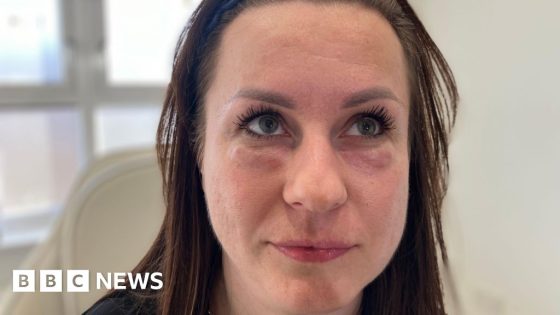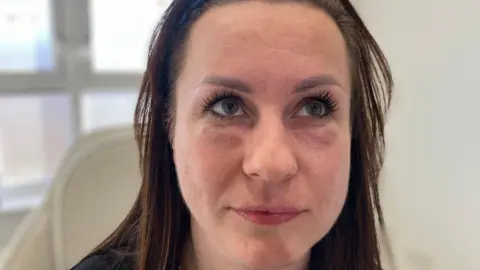 BBC
BBCScotland has become the ‘worst country in Europe’ for unqualified beauticians injecting customers with cosmetic treatments, healthcare professionals have warned.
They said people in the UK are coming to harm because there is no legislation to prevent anyone advertising on social media offering beauty treatments such as dermal fillers.
And in Scotland there is no also ban on under-18s receiving these treatments.
The British Association of Cosmetic Nurses (BACN) said most other countries have regulations that only allow trained health professionals to carry out procedures.
No rules
The BACN’s Jackie Partridge said: “Colleagues across the rest of the world are shocked and in disbelief that non-medically qualified persons are legally allowed to treat the public.
“The UK is a joke when it comes to our colleagues in the rest of the world and Scotland is the worst in the UK.”
In 2021 it became illegal in England for a person under 18 to have fillers or Botox.
However, healthcare experts said Scotland was in a severe situation because there is no ban.
They claim young people in England are crossing the border for filler treatments.
Ashton Collins, from SaveFace, a UK-government approved register for aesthetic treatments, said she had assumed Scotland would follow the move.
She said: “We keep asking for an update and so far there is no agenda for them to do that.
“What’s happened is because of the lack of action in Scotland, we’re now seeing people from places like Newcastle going up to Scotland because they can get treatments under the age of 18 with no questions asked.
“Consistently year-on-year, nearly 90% of the people that report to us find their practitioner on social media and those people are getting younger every year.”
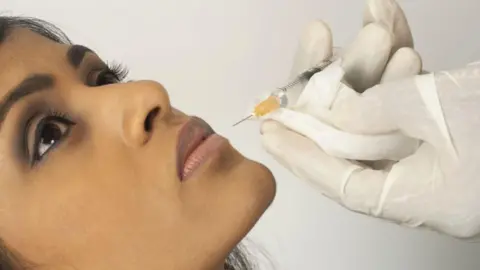 Getty Images
Getty ImagesTens of thousands of people now get dermal filler treatment across Scotland each year.
It is usually an injection into the face which helps to fill wrinkles and add volume to tissue.
But as its popularity increases so do the complications which include the risk of infection, blocked arteries, necrosis, blindness and stroke.
In 2022 the Scottish government said it would aim to ensure that all cosmetic treatments were carried out by appropriately trained professionals, but no details have been published since.
Scottish ministers have given no timeframe for further regulation whereas the UK government has said it will publish its response to a licensing scheme consultation this spring.
Patient safety
SaveFace said social media had become a “catalyst” for people falling into unsafe hands.
“It’s really unfortunate what’s happened in Scotland,” said Ms Collins.
Speaking to BBC Scotland News, Ms Partridge – who is also clinical director of Dermal Clinic in Edinburgh – said the number of unqualified personnel carrying out these procedures had “ballooned” in recent years.
She said the rise of social media as an advertising platform had led to more procedures, with “absolutely no regard for patient safety or accountability”.
Ms Partridge also said there had been a surge in “unlicensed, counterfeit and unsafe” products being passed off as botulinum toxin (Botox) in the non-medical sector.
Botox injections are anti-wrinkle treatments used to relax the muscles predominantly in the forehead, between the eyebrows and around the eyes, that last between three and six months.
Botox is classed as a prescription-only medicine in the UK, meaning it can only be prescribed and given to a patient by a qualified medical professional.
However, doctors and nurses say beauticians are finding unlicensed Botox online and injecting patients in high street salons and in their homes.
They say there is no way to know what is actually inside these products and little enforcement action to stop them.
“We know for a fact that people are walking into salons and getting Botox treatments without ever seeing a healthcare professional,” said Dr Nestor Demosthenous, a spokesperson for the British College of Aesthetic Medicine.
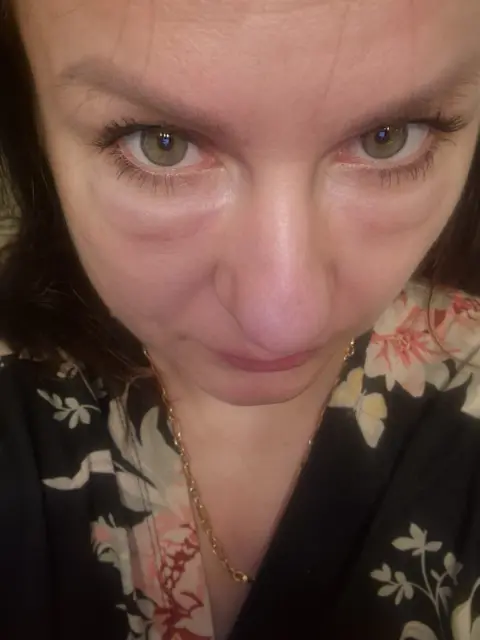
Renata Wojno, who lives in East Kilbride, paid about £600 for what she believed to be Botox injections under her eyes from a beautician advertising on Facebook.
The injections were administered in an extension at her house rather than a clinical setting – something that is currently legal.
After Renata’s skin changed colour and formed lumps, she sought help from a registered clinic and was told she now faces a choice between permanent damage or private surgery at a cost of at least £4,000.
“I’ve just lost my confidence,” she told BBC Scotland.
“It’s hard to look in the mirror because all I can see is just the lumps under my eye, and I know when people look at me they just see the lumps.
“That’s why I need to force myself to get the surgery and spend the money.”
The extent of the damage means that Renata could need an additional surgery, as well as laser treatment to correct the discoloration.
She says she regrets not checking to see if the beautician was registered, but had assumed from her social media posts that she was qualified.
“I know it’s my fault,” she said.
“I was like, surely this person who’s got lots of treatments advertised must be a qualified person, but I just didn’t check.”
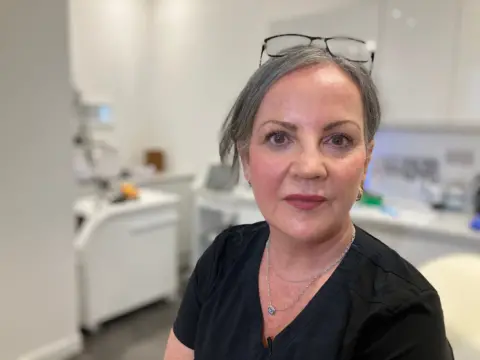
Frances Turner Traill, a prescribing nurse and director of the registered clinic that helped Renata, fears that without regulation patients could die.
“It’s a very poor situation and unfortunately Scotland is the worst in the UK, and the UK is the worst in Europe,” she said.
“It’s been 10 years that myself and colleagues have sat round the table with the Scottish government and very little has been done and it’s inexcusable, because the public is now injecting the public without any redress.”
Doctors in the field say the current lack of regulation has created a two-tier system.
“It is currently completely legal for a plumber or a hairdresser to inject a 16-year-old girl in the back of a van with no recourse,” said Dr Demosthenous.
“A non-medic can pretty much do whatever they want, anywhere they want, whereas if I were to start treating patients in a premises that wasn’t registered by the health board, I could be prosecuted.”
He said it is vital that these procedures are carried out by trained professionals because they have the medical knowledge on how to safely inject and treat complications, and advise patients when treatment is not necessary.
In a statement to BBC Scotland News, Scotland’s healthcare watchdog has now called for rules to ensure that only trained clinicians can carry out these procedures.
A spokesperson for Healthcare Improvement Scotland (HIS) said: “We believe that the best way for the public to stay safe is for cosmetic treatments to be provided from regulated providers, by appropriately trained and qualified healthcare professionals.
“People should always check that a clinic is registered with HIS before undertaking treatments.”
‘Nothing is off the table’
A Scottish government spokesperson said: “We remain focussed on engaging with stakeholders on the development of future regulation, to ensure that all non-surgical cosmetic procedures carried out in Scotland are delivered from hygienic premises by appropriately trained practitioners, applying recognised standards and using regulated products.”
Public Health Minister Jenni Minto added that she did not have timeframes for changes to the laws covering the beauty industry.
“I think it’s important for me to get the right evidence to ensure that we get the right legislation,” she said.
When asked whether this legislation would prohibit non-health professionals from carrying out these procedures, Ms Minto said she “wouldn’t want to pre-empt anything”.
“I think it’s fair to say that we will look at training, we’ll look at the premises as well, and we’ll look at age. But nothing is off the table.”
She added: “We’ve got to look very carefully at age because of course in Scotland we give 16-year-olds the vote, and I think that’s important that we take into account different characteristics in different age groups.”
Source Agencies

